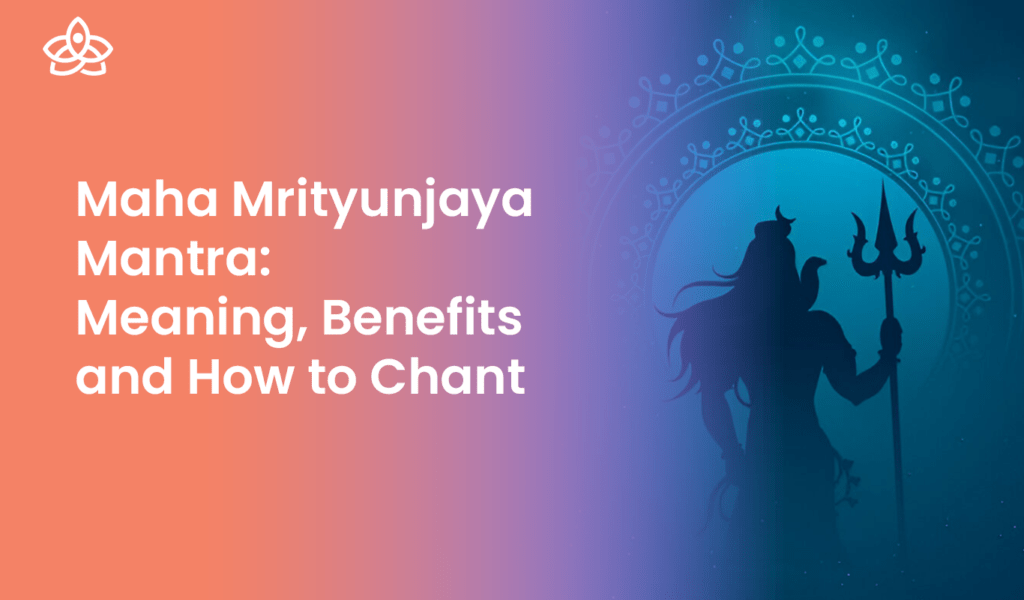The Maha Mrityunjaya mantra is the powerful mantra which is dedicated to Lord Shiva. This divine mantra was originally found in the Rig Vedas as the strongest mantra for conquering death. The Mahamrityunjay mantra, hailed by the rishis as the essence of the Vedas, assists you in connecting with the universe’s healing energy. Let’s dive into the blog to get more knowledge about the meaning of The Maha Mrityunjaya Mantra, benefits, how to chant and many more.

What is the Maha Mrityunjaya Mantra?
‘Mahamrityunjaya’ is a combination of the words Maha(great), Mrityun(death) & Jaya(victory), which entails a deeper meaning, which is Victory over Mrityun (Death). It is also known as Tryambakam Mantra. It represents the cycle of life and death, and invokes the power to transform negativity into new growth and opportunities.
The Maha Mrityunjaya Mantra:
“Om Tryambakam Yajamahe
Sugandhim Pushtivardhanam
Urvarukamiva Bandhanan
Mrityor Mukshiya Maamritat”
Meaning: We worship the pleasant-smelling three-eyed Lord- Shiva, who provides nourishment to all living beings; while praying to him, we speak of a prosperous and healthy life & liberation from death.
Here is the word to word translation of Maha Mrityunjaya Mantra:
- Om – The primeval sound, absolute reality
- Tryambakam – the three-eyed one (Shiva)
- Yajamahe – we worship, adore
- Sugandhim – the fragrant one, the fragrance of devotion
- Pushtivardhanam – the bestower of nourishment
- Urvarukamiva – like a ripened cucumber or melon
- Bandhanan – the bondage and untruth
- Mrityor – the bondage of death
- Mukshiya – may you liberate us
- Maamritat – from immortality
When Should One Chant The Maha Mrityunjaya Mantra?
According to the Shiva Purana, by chanting this mantra 108 times a day, a person can have high levels of positivity in their life. Many devotees chant this mantra with a Rudraksha Mala which contains 108 beads. The numbers ‘1’, ‘0’, and ‘8’ are very important and significant and symbolize oneness, nothingness, and everything respectively. Let’s dive into the benefits of Maha Mrityunjaya Mantra in the next heading.
Benefits of Maha Mrityunjaya Mantra:
- By chanting Maha Mrityunjaya jaap an incredible ability to restore good health within the body, banish negative forces, and rejuvenate your entire being.
- By practicing this powerful mantra, you can overcome negative energy and emotions, such as jealousy, anger, and greed.
- It creates a sense of inner peace and tranquility, so that you are better able to manage stress and anxiety.
- It helps to strengthen your immune system, boost your energy levels, and speed up the healing process of injuries and illness.
- Through recitation, devotees will experience a deeper connection with the divine and gain a sense of inner peace and clarity.
How to chant Maha Mrityunjaya mantra?
Maha Mrityunjaya mantra is a simple yet powerful practice. Maha Mrityunjaya Mantra jaap leads to the longevity of life of the performer and reduces their fear of illness and death.
Here are the few steps to chanting the Maha Mrityunjaya mantra:
- To start the mantra, find a quiet and peaceful place where you can sit properly without any distractions.
- Devotees can use a mala to count the repetitions and help keep your mind focused. A rudraksha mala would be best to use.
- The mantra should be chanted in the early morning.
- At the time of chanting the mantra, devotees should keep their face in the East direction.
- Chanting should be performed by offering Agarbatti, Diya, Flowers and Prasad.
Conclusion:
In the end of the conclusion, Maha Mrityunjaya Mantra is used for have protective and healing properties, and chanting it is considered beneficial for physical, mental, and spiritual well-being. It invokes expressing gratitude, seeking blessings, and contemplating on the significance of the mantra. Mrityunjaya Mantra is commonly associated with overcoming the fear of death and seeking liberation from the cycle of life and death (moksha). After the jaap, people might say prayers, engage in meditation, or just think back on the glorious attributes of Lord Shiva and the mantra’s ability to change their life.



